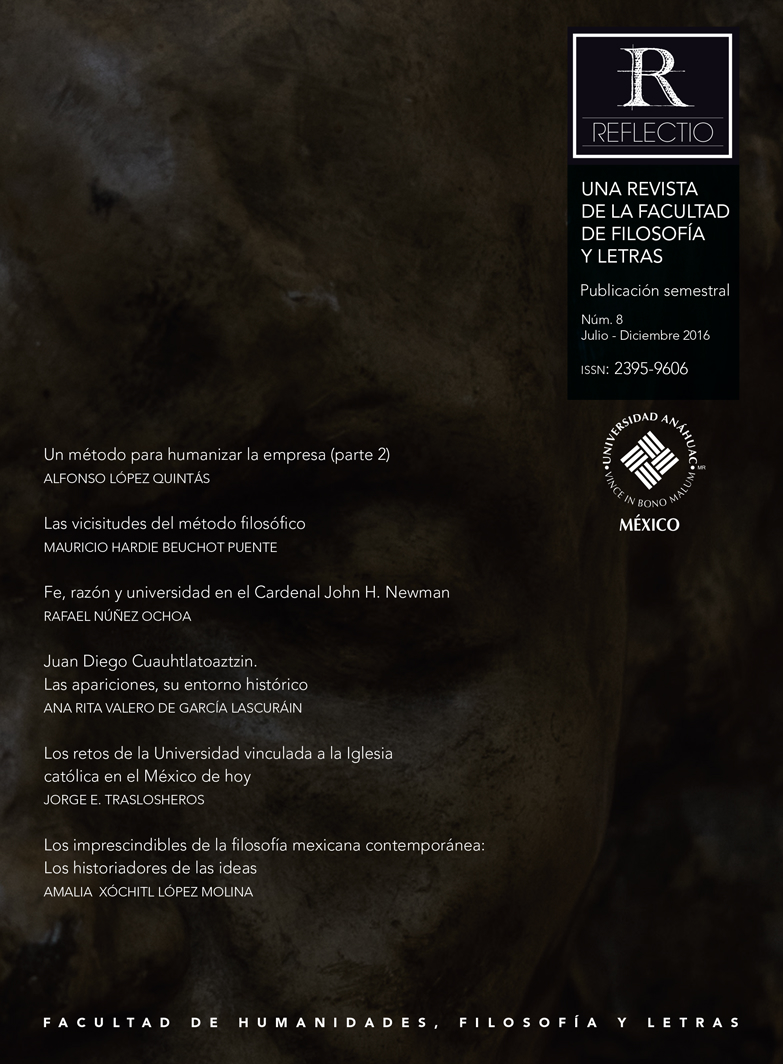LOS IMPRESCINDIBLES DE LA FILOSOFÍA MEXICANA CONTEMPORÁNEA
LOS HISTORIADORES DE LAS IDEAS
Palabras clave:
México, Filosofía contemporánea, historia de las ideas, imprescindibles, originalidadResumen
En este artículo exponemos
brevemente las ideas de siete pensadores
mexicanos (José Gaos, Leopoldo Zea, Luis
Villoro, Carmen Rovira, Edmundo O´Gorman,
Graciela Hierro y Mauricio Beuchot).
Sus originales propuestas han influido en
el ambiente filosófico de la segunda mitad
del siglo XX, lo que nos permite reconocerlos
como “imprescindibles de la filosofía mexicana
contemporánea”. Sus estudios se basan
en la conciencia de la necesidad de realizar la
historia de las ideas de su propio país como
la condición obligada para crear filosofía. Así,
el conocimiento de la historia de la filosofía
propia, permite que su obra filosófica emerja
como solución de los problemas de su propio
contexto y circunstancia.
Descargas
Referencias
Ardao, Arturo (1987). La inteligencia latinoamericana. Montevideo: Universidad de la República.
Beuchot Puente, Mauricio (1996). Historia de la filosofía en el México colonial. Barcelona: Herder, 280 pp.
_____ (1997). Perfiles esenciales de la hermenéutica. México: UNAM, 102 pp.
_____ (1995). Derechos humanos, iuspositivismo y iusnaturalismo. México: UNAM.
_____ (2001). Filosofía y derechos humanos. México: Siglo XXI.
Gaos, José (1980). En torno a la filosofía mexicana. México: Alianza Editorial Mexicana, 190 pp.
_____ (1990). “Pensamiento Español” en Obras completas tomo VI. México: UNAM, pp. 329-406.
_____ (1990). “Pensamiento de lengua española” en Obras completas tomo VI. México: UNAM, pp. 23-328.
Hierro, Graciela (1982). Naturaleza y fines de la educación superior. México: UNAM.
_____ (2002). De la domesticación a la educación de las mexicanas (2ª edición). México: Torres Asociados, 136 pp.
O´Gorman, Edmundo (2001). La invención de América (7ª reimpresión de la 3ª edición). México: FCE, 196 pp.
_____ (2007). Ensayos de filosofía de la historia. México: UNAM, 112 pp.
Rovira Gaspar, Carmen (2004). Francisco de Vitoria. América y España. El poder y el hombre. México: Porrúa, 310 pp.
_____ (Tomo I, 2010 y Tomo II, 2011). Una aproximación a la historia de las ideas filosóficas en México. Siglo XIX y primeros años del XX. México: UAQ, UGuan, UA de Madrid y UNAM.
_____ (2013). Dos utopías mexicanas del siglo XIX. Francisco Severo Maldonado y Juan Nepomuceno Adorno. México: Universidad de Guanajuato, 214 pp.
Villoro, Luis (1987). Los grandes momentos del indigenismo en México. México: SEP (Colección Lecturas Mexicanas, segunda serie, n° 103), 248 pp.
_____ (2002). El proceso ideológico de la Revolución de Independencia (2ª edición, 1ª reimpresión). México: CONACULTA, 256 pp.
_____ (2006). El poder y el valor (5ª reimpresión). México: FCE, 400 pp.
_____ (2007). Los retos de la sociedad por venir. México: FCE, 226 pp.
Zea, Leopoldo (1953). América como conciencia. México: Cuadernos americanos.
_____ (1985). El positivismo y la circunstancia mexicana. México: FCE-SEP, 192 pp.
_____ (1998). La filosofía americana como filosofía sin más (17ª ed.). México: Siglo XXI, 120 pp.
_____ (1983). Introducción a la filosofía. La conciencia del hombre en la filosofía (9ª ed.). México: UNAM, 258 pp.
Varios (1968). Revista de la Universidad de México, enero (Separata).
Descargas
Publicado
Número
Sección
Licencia

Esta obra está bajo una licencia internacional Creative Commons Atribución-NoComercial-SinDerivadas 4.0.
Reflectio se distribuye bajo licencia internacional Licencia Creative Commons Atribución-NoComercial-CompartirIgual 4.0 Internacional.
El autor conserva los derechos patrimoniales sin restricciones y garantiza a la revista el derecho de ser la primera publicación del trabajo. El autor es libre de depositar la versión publicada en cualquier otro medio, como un repositorio institucional o en su propio sitio web.















